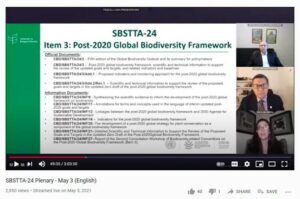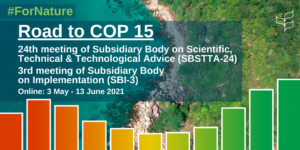|
The first part of the twenty-fourth meeting of the Subsidiary Body on Scientific, Technical and Technological Advice (SBSTTA-24) took place online from 3 May to 9 June 2021. The event, which was postponed and delayed due to the COVID-19 pandemic, consisted of three blocks of plenary and contact group sessions, and was attended by over 1,500 registrants, representing 102 countries. As with all SBSTTA meetings, the aim of this event was to provide multidisciplinary and timely advice to the Conference of the Parties (COP) and carry forward the work of the Convention on Biological Diversity (CBD) and its Protocols (see https://www.cbd.int/sbstta/ for more information). Among some of the agenda items covered during this first-ever virtual SBSTTA were the post-2020 global biodiversity framework (post-2020 GBF), marine and coastal biodiversity, biodiversity and agriculture, biodiversity and health, and invasive alien species. |
|
|
GEO BON prepared and submitted two written interventions for the following items: On the post-2020 GBF (agenda item 3), GEO BON submitted a statement on the monitoring framework with a key message of support for the implementation of the monitoring framework within the post-2020 GBF through the provision of scalable indicators and through related technical support. GEO BON specified that fit-for-purpose indicators–operational at the national level–are required to enable the effective progress towards the framework’s targets. The essential variables on biodiversity, ecosystem, and ecosystem services (EBVs and EESVs) established by GEO BON can provide a basis for the headline, component and complementary indicators within the framework. To read GEO BON’s statement in its entirety, visit the SBSTTA meeting website (see Statements on Tuesday, 4 May 2021). On marine and coastal biodiversity (agenda item 6), GEO BON submitted a statement that highlighted the significant scientific progress in developing technologies for in situ coastal and marine biodiversity monitoring, and in developing and implementing data formatting standards and open data systems. GEO BON supported the recommendation to advance the development of relevant indicators based on EBVs and the establishment of a technical expert group to advise on the further operationalization of the monitoring framework for the post-2020 GBF. See the SBSTTA meeting website to read GEO BON’s full statement and proposed specific text amendments (Statements on Tuesday, 4 May 2021). On behalf of GEO BON, Andrew Gonzalez gave an oral and written statement during the contact group on the definitions and role of baselines in the context of the proposed monitoring framework for the post-2020 GBF. This was well received and unblocked discussion on this topic. GEO BON was thanked for its contribution. In addition to these interventions, GEO BON prepared items for Parties’ consideration on: |
|
|
Scalable data, observation systems and indicators to support effective monitoring of goals and targets for the post-2020 global biodiversity framework: GEO BON support for implementation This 16-page document, generated by the Policy Task Force and GEO BON members, highlights that the scalable nature of EBVs and EESVs and their derived indicators lend themselves well to the flexible implementation of a set of headline, component and complementary indicators of the GBF that Parties can adopt and apply for national reporting and target tracking. Their use will facilitate more coherent and comparable national reporting and more reliable measurements of the contribution to national commitments to global targets. GEO BON proposed to support the implementation of the post-2020 GBF by 1) establishing and supporting a global network of biodiversity observation systems, 2) producing, delivering, and providing guidance around existing CBD-endorsed EBVs, 3) supporting the advancement of not yet fully operational/developed headline indicators, and 4) providing capacity-building webinars to guide effective implementation of the post-2020 GBF. |
|
|
Inclusion of genetic diversity in the post-2020 global biodiversity framework: scientific and technical knowledge This 11-page document, generated by the Genetic Composition Working Group, focuses on the need for explicit evidence-based consideration, protection, and monitoring of genetic diversity in the post-2020 GBF. Key elements of this document summarize the state of knowledge that genetic diversity within all species—not just agricultural species—contributes to species’ survival, ecosystem resilience and productivity, and nature’s contribution to people, as well as what the CBD has mentioned about genetic diversity thus far in previous documents. This document notes that while many countries are working to implement genetic diversity monitoring, it is also important to consider that genetic diversity reporting and monitoring can be achieved through the use of a combination of DNA-based observations, EBVs, and proxies such as species population size and geographic range. Across the board, GEO BON stands ready to offer support in capacity building and in developing national and regional observing networks, and to work jointly with CBD Parties. Progress made during SBSTTA-24 will contribute to the development of the post-2020 GBF and provide advice to the Open-ended Working Group ahead of its third meeting (OEWG3), scheduled for 23 August to 3 September 2021. Advancement in the work of the OEWG will ultimately feed into the COP which is scheduled to adopt the post-2020 GBF at COP 15 (currently scheduled for 11 to 24 October 2021). While no final documents were to be considered during this first (virtual) part of SBSTTA-24, the progress made is expected to continue and be adopted when SBSTTA resumes during the second physical meeting. This meeting is expected to be organized back-to-back with either a physical meeting of the OEWG on the post-2020 GBF or COP 15, unless otherwise decided by the SBSTTA and COP Bureaux. |
|
 Opening Plenary with Executive Secretary of the Convention on Biological Diversity,
Elizabeth Maruma Mrema
|
 Plenary on the post-2020 GBF, presented by Jillian Campbell of the Convention on
Biological Diversity
|
|
Re-watch SBSTTA-24 via YouTube (link to opening day, multiple languages available) Relevant official CBD documents:
Information documents:
|
|
GEO BON’s participation in SBSTTA-24
News from: News from the GEO BON Secretariat

